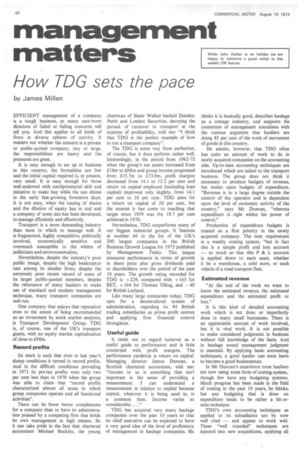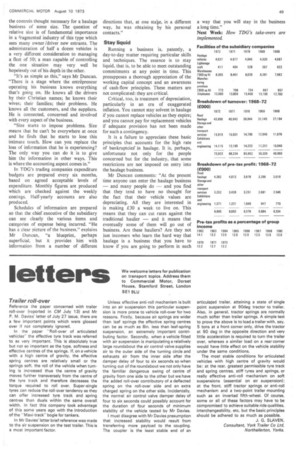management matters
Page 50

Page 51

If you've noticed an error in this article please click here to report it so we can fix it.
How TDG sets the pace
by James Millen
EFFICIENT management of a company is a tough business, as many care-worn directors of failed or failing concerns will tell you. And this applies to all kinds of firms in diverse spheres of activity. It matters not whether the concern is a private or public-quoted company, tiny or large, the responsibilities are heavy and the pressures are great.
It is easy enough to set up in business in this country, the formalities are few and the initial capital required is, at present, very small. It is easy enough for those well-endowed with entrepreneurial skill and initiative to make hay while the sun shines in the early fast-growing formative days. It is not easy, when the issuing of shares and the dilution of equity has to end and a company of some size has been developed, to manage efficiently and effectively.
Transport is a more demanding industry than most in which to manage well. It is fragmented, highly competitive, politically involved, economically sensitive and overmuch susceptible to the whims of politicians and environmentalists.
Nevertheless, despite the industry's poor public image, despite the high bankruptcy rate among its smaller firms, despite the extremely poor recent record of some of its larger public-quoted members, despite the reluctance of many hauliers to make use of standard and modern management technique, many transport companies are well run.
One company that enjoys that reputation even to the extent of being recommended as an investment by stock market analysts, is Transport Development Group. TDG is, of course, one of the UK's transport giants, with an equity market capitalization of close to £90m.
Record profits Its merit is such that even in last year's slump conditions it turned in record profits. And in the difficult conditions prevailing in 1971 its pre-tax profits were only two per cent less than in 1970 when the group was able to claim that "record profits characterized almost all areas in which group companies operate and all functional activities".
There can be fewer better compliments for a company than to have its administration praised by a competing firm that holds its own management in high esteem. So it can take pride in the fact that chartered accountant Michael Buckley, the young
chairman of Slater Walker-backed Dundee, Perth and London Securities, decrying the pursuit of turnover in transport ' at the expense of profitability, told me: "I think that TDG is the perfect example of how to run a transport company".
The TDG is some way from perfection, of course, but it does perform rather well. Interestingly, in the period from 1962-72 when the group's net assets increased from £18m to £68m and group income progressed from £15.7m to £73.9m, profit margins decreased from 14.1 to 12.2 per cent and return on capital employed (excluding loan capital) improved only slightly, from 14.1 per cent to 16 per cent. TDG aims for a return on capital of 20 per cent, but the nearest , it has come to reaching that target since 1959 was the 18.7 per cent achieved in 1970.
Nevertheless, TDG outperforms many of our biggest industrial groups. It features at number 66 in the list of the UK's 200 largest companies in the British Business Growth League for 1973 published by Management Today. This league measures performance in terms of growth in share price plus gross dividends paid to shareholders over the period of the past 10 years. The growth rating recorded for TDG is +229, compared with +165 for BET, + 164 for Thomas Tilling, and 40 for British Leyland.
Like many large companies today, TDG opts for a decentralized system of administration, regarding its 94 British trading subsidiaries as prime profit centres and applying firm financial control throughout.
Useful guide It tends not to regard turnover as a useful guide to performance and is little concerned with profit margins. The performance yardstick is return on capital. Managing director James Duncan, a Scottish chartered accountant, told me: "Income to us is something that isn't important in the sense of providing a measurement. I can understand a measurement in relation to capital because capital, whatever it is being used in, is a common item. Income varies so considerably...."
TDG has acquired very many haulage companies over the past 10 years so that its chief executive can be expected to have a very good idea of the level of proficiency of management in haulage companies. He thinks it is basically good, describes haulage as a cottage industry, and supports his contention of management soundness with the curious argument that hauliers are doing 85 per cent of the work of movement of goods in this country.
He admits, however, that TDG often has quite an amount of work to do in newly acquired companies on the accounting side. Up-to-date accounting techniques are introduced which are suited to the transport business. The group does not think it .necessary to produce budgets of revenue, but insists upon budgets of expenditure. "Revenue is to a large degree outside the control of the operator and is dependent upon the level of economic activity of the country," says Mr Duncan, "whereas expenditure is right within his power of control."
Production of expenditure budgets is treated as a first priority in the newly acquired company. The next requirement is a weekly costing system, "but in fact this is a simple profit and loss account — so much so that this P & L account is applied down to each asset, whether it be a warehouse, a cold store, or each vehicle of a road transport fleet.
Estimated revenue "At the end of the week we want to know the estimated revenue, the estimated expenditure and the estimated profit or loss."
It is this kind of detailed accounting work which is not done or imperfectly done in many small businesses. There is an appreciable amount of work involved, but it is vital work. It is not possible to make considered judgments in business without full knowledge of the facts. And in haulage sound management judgment is essential. By applying basic accounting techniques, a good haulier can soon learn to become a good businessman.
In Mr Duncan's experience most hauliers are now using some form of costing system, though few have any budgeting systems. Much progress has been made in the field of costing in the past 10 years, he thinks, but any budgeting that is done on expenditure tends to be rather a hit-ormiss technique.
TDG's own accounting techniques as applied to its subsidiaries are by now well tried — and appear to work well. These "well rounded" techniques are injected into new acquisitions, applying all the controls thought necessary for a haulage business of some size. The question of relative size is of fundamental importance in a fragmented industry of this type which sees many owner/driver new entrants. The administration of half a dozen vehicles is a very different consideration to managing a fleet of 50; a man capable of controlling the one situation may very well be hopelessly out of his depth in the other.
"It's as simple as this," says Mr Duncan. "There is a stage where the entrepreneur operating his business knows everything that's going on. He knows all the drivers by their Christian names; he knows their wives; their families; their problems. He knows all the customers, and the suppliers. He is connected, concerned and involved with every aspect of the business.
"Size starts to impose problems. Size means that he can't be everywhere at once and he finds that he starts to lose this intimate touch. How can you replace the loss of information that he is experiencing? The only way you can do it is to give him the information in other ways. This is where the accounting aspect comes in."
In TDG's trading companies expenditure budgets are prepared every six months, based on agreed acceptable levels of expenditure. Monthly figures are produced which are checked against the weekly costings. Half-yearly accounts are also produced.
Schedules of information are prepared so that the chief executive of the subsidiary can see clearly the various items and categories of expense being incurred. "He has a clear picture of the business." explains Mr Duncan, "a blueprint, perhaps superficial, but it provides him with information from a number of different directions that, at one stage, in a different way, he was obtaining by his personal contacts."
Stay liquid Running a business is, patently, a day-to-day matter requiring particular skills and techniques. The essence is to stay liquid, that is, to be able to meet outstanding commitments at any point in time. This presupposes a thorough appreciation of the working capital concept and an awareness of cash-flow principles. These matters are not complicated: they are critical.
Critical, too, is treatment of depreciation, particularly in an era of exaggerated inflation. You cannot stay solvent in haulage if you cannot replace vehicles as they expire; and you cannot pay for replacement vehicles if adequate provision has not been made for such a contingency.
It is a failure to appreciate these basic principles that accounts for the high rate of bankruptcies" in haulage. It is, perhaps, unfortunate not only for the people concerned but for the industry, that some restrictions are not imposed on entry into the haulage business.
Mr Duncan comments: "At the present time anyone can enter the haulage business and many people do and you find that they tend to have no thought for the fact that their vehicle values are depreciating. All they are interested in is making /30 a week to live on. This means that they can cut rates against the traditional haulier and it means that eventually some of them will go out of business. Are these hauliers? Are they not just incomers who learn the hard way that haulage is a business that you have to know if you are going to perform in such




























































































